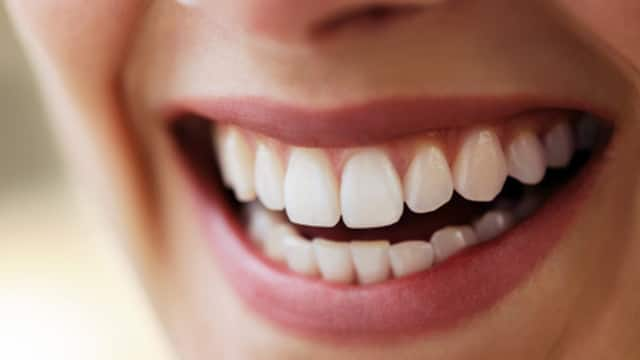What is Dentin Hypersensitivity?
Dentin hypersensitivity is the discomfort or pain that one experiences in one or more teeth, usually triggered by hot, cold, sweet, or sour foods and drinks, or even by breathing in cold air. Your teeth become sensitive when the enamel wears out or when the gums recede, exposing the underlying dentin.
The exposed dentin surface contains tiny tubes, called dentinal tubules, which lead directly to the nerve of the tooth. When these tubules are exposed, external stimuli (thermal, chemical, or osmotic) can reach the nerve, resulting in the sharp pain associated with tooth sensitivity.
If you are experiencing tooth sensitivity, it is a sign that your dentin is exposed and the dental pulp inside your tooth is vulnerable to damage. Inflammation of the dental pulp, termed pulpitis, produces true hypersensitivity of the nerves in the dental pulp. In some cases, tooth sensitivity can also be an early warning of an underlying dental issue that needs to be addressed promptly.
What Causes Dentin Hypersensitivity?
Dentin hypersensitivity often arises from gingival recession, where the gums recede and expose the root surfaces. This exposure results in the loss of the protective cementum layer and the smear layer, leaving the dentin vulnerable. Understanding the common factors that contribute to exposed dentin is crucial for effectively managing and preventing sensitivity. The most common causes of hypersensitivity include:
Tooth wear: Brushing too hard can wear away enamel, especially near the gums, exposing dentin and resulting in sensitivity.
Improper restorations: A cracked tooth exposes the dentin to external stimuli, irritating the tooth nerve and causing pain.
Tooth bleaching: Sensitivity can be a side effect of teeth bleaching, as some may experience this for a short time during or after the treatment.
Periodontitis: Gum diseases, or periodontal diseases, can lead to tooth sensitivity by damaging the bone and supporting tissues, exposing tooth-root surfaces, and causing pain.
Teeth grinding: Grinding or clenching teeth, known as bruxism, can wear away tooth enamel, expose the underlying dentin, and cause tooth sensitivity.
Dental caries: Tooth decay can cause tooth sensitivity by penetrating the enamel and dentin, exposing the inner layers of the tooth to external stimuli.
Acidic foods: Regular consumption of acidic foods and drinks can erode enamel, dissolve the tooth surface, and expose dentin, which leads to sensitivity.
Plaque buildup: Poor dental hygiene can lead to plaque and tartar buildup, which causes gum recession and exposes tooth roots to stimuli, resulting in sensitivity.
Gastroesophageal reflux (GERD): Acid reflux can also contribute to enamel erosion and dentin exposure, leading to tooth sensitivity.
Dentin Hypersensitivity Symptoms
Common hypersensitivity symptoms include sudden, sharp pain that penetrates deep into the tooth’s nerve endings when consuming hot, sour, cold, or sweet foods and drinks. Typically, dentin hypersensitivity causes mild to severe discomfort or pain that can last for several hours.
If you are experiencing any of these symptoms, it is crucial to visit your dental professional as soon as possible to identify the cause of your dentin sensitivity. With an early diagnosis, you can receive appropriate treatment and prevent the issue from becoming more severe. Some clinical studies have shown that treatments targeting dentinal tubules and their occlusions can significantly reduce sensitivity.
How is Dentin Hypersensitivity Treated?
Dentin hypersensitivity treatment largely depends on the underlying cause. If your sensitivity is due to a cavity, a restoration might be necessary. If the root cause is gum disease, your dental professional will be able to treat it.
Treatment for dentinal hypersensitivity can be provided using in-office or home-use products. These work in one of two ways: either by occluding the dentinal tubules, which then prevents movement of tubular fluid, or by using a depolarizing agent that prevents the transmission of pain signals. Here are some of the various treatment options available to help alleviate sensitivity:
A dentist applies fluoride varnish, resin sealers, or gel to teeth to strengthen the enamel and dentin.
Sealing of the exposed tubules using agents in severe cases using dental cement or composites.
Filling cavities or having a root canal treatment to address deeper tooth decay.
Fixing injured teeth or replacing worn fillings.
Use a toothpaste specially formulated for sensitive teeth along with a soft-bristled toothbrush to brush twice a day.
If you are looking for a desensitising toothpaste for everyday use, consider trying Colgate Sensitive Plus with Pro-Argin technology. This toothpaste offers instant relief from dentin hypersensitivity, starting with the first use. Its Pro-Argin formula works from the very first use by forming a plug of calcium carbonate, calcium phosphate, and arginine to seal the dentin tubules and prevent sudden shocks of pain. It also builds a calcium-rich layer over the exposed dentin, promoting enamel repair and providing long-lasting relief with consistent use.
How to Prevent Dentin Hypersensitivity?
If you are wondering how to prevent sensitivity, follow these tips:
If you are using teeth-whitening products, choose those approved by your dental professional after assessing your enamel health.
Maintain good oral hygiene by brushing twice daily with a fluoride toothpaste that is not highly abrasive, and flossing daily.
Avoid habits that lead to enamel attrition, such as chewing on hard objects or clenching your teeth.
Use at-home desensitising agents in the form of mouthwashes and toothpaste specially formulated for sensitive teeth to block pain and strengthen enamel, protecting the dentin.
Manage dietary habits to adhere to a diet low in acidic foods and drinks to help prevent tooth sensitivity.
Consider using mouthguards to protect against tooth grinding and dental damage, which can contribute to dentin hypersensitivity.
When Should You See a Dental Professional?
Consult a dental professional for a clinical examination if you experience severe tooth sensitivity. Seek help and get in-office treatment if sensitivity lasts more than a few weeks, causes significant pain, if you notice signs of decay or damage, or if it occurs after a dental procedure.
A differential diagnosis is essential to identify the exact cause of your sensitivity and ensure appropriate sensitivity treatment. Early diagnosis and treatment of dentin hypersensitivity in the field of dentistry can prevent more serious pulpal complications, especially in critical areas like the canines and premolars, and alleviate your discomfort.
Maintaining good oral health is essential for a better quality of life. Given the prevalence of dentin hypersensitivity, it is crucial to understand its causes and symptoms to seek appropriate treatment. Topical treatments, bonding agents, occluding treatments, and specialised dentifrices designed for sensitive teeth can also play a crucial role in minimising dentin permeability and alleviating symptoms.
By recognising the symptoms early and following preventive measures, you can significantly reduce the impact of dentin hypersensitivity, manage lesions effectively, and get personalised treatment from a dental professional that may include remineralization techniques to improve your overall oral health.
Frequently Asked Questions
Can you fix dentin hypersensitivity?
Yes, dentin hypersensitivity can be managed and treated. Treatment options include using desensitizing toothpaste, and in-office therapies using desensitizing agents. These treatments may involve sealing exposed dentin or addressing underlying dental issues.
How long does dentin hypersensitivity last?
Dentin hypersensitivity can last anywhere from a few days to several weeks. The duration depends on the underlying cause and the effectiveness of the treatment used. If the sensitivity persists beyond a few weeks, consult a dental professional for a thorough examination and appropriate treatment.
How do you test for dentin hypersensitivity?
There are no objective tests for dentin hypersensitivity. Instead, it is diagnosed based on the hypersensitivity symptoms, the patient's report of pain, and the systematic exclusion of other potential causes.
Is dentin hypersensitivity normal?
Yes, dentin hypersensitivity is a common condition that affects many people. It occurs when the dentin layer of the tooth becomes exposed, leading to pain in response to certain stimuli such as hot, cold, sweet, or acidic foods and drinks.
This article is intended to promote understanding of and knowledge about general oral health topics. It is not intended to be a substitute for professional advice, diagnosis or treatment. Always seek the advice of your dentist or other qualified healthcare provider with any questions you may have regarding a medical condition or treatment.
ORAL HEALTH QUIZ
What's behind your smile?
Take our Oral Health assessment to get the most from your oral care routine
ORAL HEALTH QUIZ
What's behind your smile?
Take our Oral Health assessment to get the most from your oral care routine











